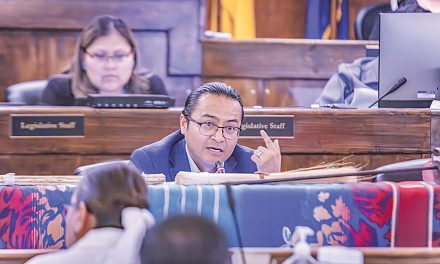
50 Years Ago: N.M. gov crusades against alcohol
Navajo Tribal Chairman Raymond Nakai journeyed to Alamo, the small Navajo community southwest of Albuquerque, 50 years ago to give the 800 residents some good news.
Construction of a power line to the community was ahead of schedule and should be completed by August.
At the time, tribal officials were saying that this may have been Nakai’s first visit to the community since taking office some five years before. The fact that he did not venture to that area during his recent campaign may have been the reason he lost Alamo to Sam Billison in the last election for president.
He told members of the Alamo Chapter he couldn’t wait to get there to tell them the good news that they would soon be able to discard those kerosene lamps and their candles to finally start enjoying a better quality of life.
But he couldn’t help but point out that some 58 percent of all Navajo homes still did not have running water or electrical services — and something needed to be done about it.
He didn’t come up with any solutions, except to say that the federal government needed to step up and provide the funds — an estimated $600 million — over a 10-year period.
But that wasn’t all the good news he had for the Alamo community. Because of the availability of electricity for the first time, a total of 162 homes were scheduled to be built over the next three years in the community.
Like the homes they would replace, said Nakai, the homes would face east per Navajo tradition.
In other news, something happened about 50 years ago on the Navajo Reservation that got a lot of play in state newspapers.
New Mexico Gov. David Cargo was on his way to meet with officials for the Shiprock Chapter on a variety of mutual interests when he decided on the spur of the moment to stop at the Turquoise Bar about seven miles east of Shiprock.
No one had planned the event but Cargo said he had been thinking about the growing problem of alcohol abuse among the Navajo people and who better to give him an unbiased respective than the owner of the bar?
Luckily the owner, Mary Taylor, was there so the two had an opportunity to sit down and discuss the problem of alcoholism.
It wasn’t a very cordial discussion, Cargo said later.
The first thing he brought up was the numerous complaints that his office had received from tribal leaders about liquor sales at the Turquoise Inn. He also pointed out to Taylor that several Navajos had been killed in accidents on that stretch of road.
That’s just a portion of the bad effects alcohol consumption had on the reservation, he said, adding that he was still under he impression that lack of education was the biggest result — people were too addicted to continue their studies.
Cargo said he had been told that 177 people, mostly Navajo men, had died in that area between 1962 and 1967. He said he was told that the bar was very inexpensive and that a lot of Navajos enjoyed spending a day or two before having to go back to Window Rock.
He said he was also told that the Turquoise Bar had another distinction – it had sold more than 1,800 bottles of beer in one day to the Indians. He said the demonstration got to him: He planned to get tougher on bar owners in and around Gallup.
Cargo told Taylor that he was thinking of getting support from people running the bar by putting a scare into them and promised he would start taking away people’s liquor licenses if the situation didn’t get better.
The big news for Nakai this week 50 years ago was his announcement that he was pushing for Harold Mott, a Washington attorney, to replace Norman Littell as the tribe’s general counsel.
On the books, Littell was making $35,000 a year as general counsel but he had so many side deals with the tribe it was hard to say how much money he was actually making.
Mott was proposing a $100,000 a year contract but said this would also pay for attorneys and staff he would need to carry out the tribe’s legal business.
The problem was, however, that he had competition for the job.
The Old Guard who had supported Littell was now supporting the appointment of another Washington law firm, Wilkinson, Cargun and Barker, who were proposing the same $100,000 a year fee.
Their firm was better known but Nakai worried that if they got the contract, they would listen to members of the Old Guard and not him and it would just be another case like Littell, so he told his staff he planned to spend a lot of time during the next month lobbying members of the Council on behalf of Mott.
To read the full article, pick up your copy of the Navajo Times at your nearest newsstand Thursday mornings!
Are you a digital subscriber? Read the most recent three weeks of stories by logging in to your online account.








 Highway 264,
Highway 264, I-40, WB @ Winslow
I-40, WB @ Winslow